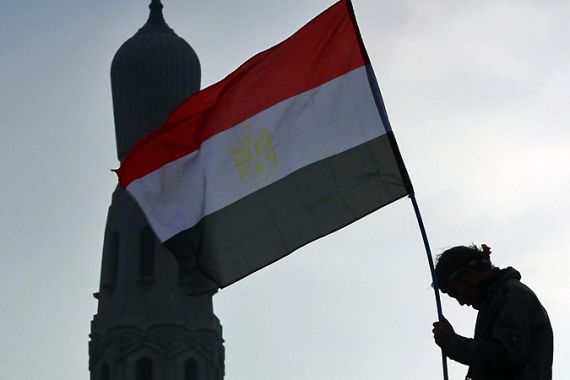Freed cyber activist lauds protests
Google executive Wael Ghonim speaks after release from Egyptian custody, sparking outpouring of support from protesters.

| Egypt’s demonstrations have been ongoing since January 25 as protesters call for Mubarak to resign |
Egyptian anti-government protesters have welcomed the release of a Google executive who disappeared in Cairo last month after playing a key role in helping demonstrators organise.
Wael Ghonim was released on Monday by Egyptian authorities, sparking a fast and explosive response from supporters, bloggers and pro-democracy activists on the internet.
Ghonim’s release came nearly two weeks after he was reported missing on January 28 during protests against Egyptian president Hosni Mubarak.
“Freedom is a bless[ing] that deserves fighting for it,” Ghonim, Google’s head of marketing for the Middle East and North Africa, wrote in a message posted on his Twitter account shortly after his release.
He said he was seized in the Egyptian capital, Cairo, late last month as he joined tens of thousands of protesters in the city’s Tahrir Square, the focal point of protests aimed at calling on Mubarak to step down from his 30-year-rule in Egypt.
Ghonim said he was picked up by three plainclothes men on the street, pushed into a car and taken off for interrogation by state security members.
‘Not a hero’
The prominent blogger spoke to Egypt’s On TV after his release on Monday, pleading with reporters not to call him a hero.
“Please don’t make me a hero. I’m not a hero. I have been asleep for 12 days,” he said.
|
Part one of Ghonim’s interview with Dream TV. For part two and a translation of both, click here for our live blog. All rights to video belong to Dream TV. |
“I hope that we would be able to put an end to all the rubbish in this country. The rubbish really needs to be cleaned up.”
Ghonim gave a subsequent, emotional interview to the privately owned Egyptian channel Dream TV later on Monday.
“I am not a symbol or a hero or anything like that, but what happened to me is a crime,” he told Dream TV.
“If you want to arrest me, that’s your right. But there are laws and I am not a terrorist or a drug-dealer. We have to tear down this system based on not being able to speak out.”
Ghonim said he was blindfolded during his 12 days in the custody of state security so that he could not identify his interrogators, but he said that he was not physically tortured.
He described his abduction as a “crime which we are fighting”, adding that the law that allows such actions such be changed – a reference to the country’s emergency laws.
Al Jazeera’s correspondent in the northern Egyptian city of Alexandria said the interview will “no doubt have a massive impact on the number of pro-democracy protesters” in the country.
“I expect their numbers to increase dramatically tomorrow and Friday because of this show,” our correspondent said.
“The show also included an interview with a former state TV presenter who dismissed her previous employers as liars and propaganda artists for Mubarak.
“The show ended with a plea from her: ‘To all the children watching this show, go to your parents, tell them: mum, dad, if you want me to have a brighter future, a good education, then take me to Tahrir square tomorrow’.”
Sparking the uprising
Activists said Ghonim was the person behind a page on the social networking site Facebook that is credited for helping spark the uprising in Egypt.
|
|
The “We are all Khaled Said” page and Facebook group was named after an Egyptian activist who rights groups said was beaten to death by police in the northern port city of Alexandria. Two officers are now facing trial in the case.
Pro-democracy protesters have continued their sit-in in Cairo’s Tahrir Square since mass protests began on January 25. The demonstrations showed no signs of being appeased on Tuesday by talks between the government and opposition groups on Sunday.
But the number of protesters in the streets has decreased since the height of the protests on January 28, a day demonstrators billed the Day of Wrath.
However, immediately after Ghonim’s interview on Dream TV on Monday, activists asserted that the blogger had breathed new life into the protests.
“Left breathless by Wael Ghonim. InshaAllah his sincerity & patriotism, beamed into Egypt’s living rooms, will ignite this revolution #Jan25,” Twitter user Desert_Dals wrote.
“My aunt called me crying after Ghonim’s interview saying “I’m going to Tahrir tomorrow! God Bless him! He made us proud!” Twitter user MennaGamal wrote on her account.
“Ghonim just became the mayor of Tahrir Square!” Twitter user AngelSavant wrote.
DFMorrison, another Twitter user wrote, “If you feel recharged by #Ghonim for the Egyptian Revolution to reach its goals, Retweet! #Tahrir #Egypt #25Jan.”
The UN says at least 300 people have been killed in the violence since the demonstrations began, with Human Rights Watch, the international rights group, putting the number killed in the cities of Cairo, Alexandria and Suez at 297 on Monday.
Ghonim, in his interview on Monday, paid tribute to those killed.
“I want to say to every mother and every father that lost his child, I am sorry, but this is not our fault.
“I swear to God, this is not our fault. It is the fault of everyone who was holding on to power greedily and would not let it go.”